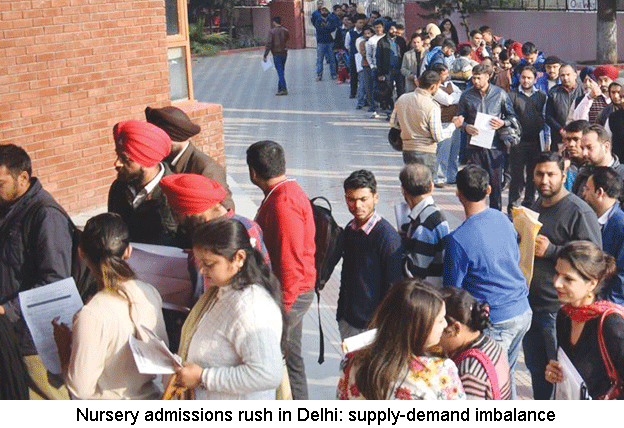 The prolonged see-saw courtroom battles between private schools, NGOs and the state government of Delhi over the issue of the admission process of children into nurseries of composite K-12 schools may well see closure soon.
The prolonged see-saw courtroom battles between private schools, NGOs and the state government of Delhi over the issue of the admission process of children into nurseries of composite K-12 schools may well see closure soon.
On February 14 and again on 27, the Delhi high court refused to vacate its stay order on a January 7 state government notification. The notification decreed admission criteria for 298 schools constructed on land provided at concessional rates by the Delhi Development Authority, leaving the other 15,800 composite schools in the national capital to admit nursery children according to their own criteria.
The 298 schools were directed to give priority to neighbourhood children residing within a circumference of 1 km. If seats remained vacant, the catchment area could be expanded to 3 and 6 km. The notification also directed the schools to give weightage to siblings of children already admitted.
Even as the appeal of the state government is pending, all eyes are now on a separate petition scheduled to be heard by the apex court where the petitioner — Social Jurist, the well-known NGO — has prayed for inclusion of preschool education under the Right of Children to Free & Compulsory Education (RTE) Act, 2009. If the apex court decides in favour of the petitioner, then admissions will be through draw of lots.
Inevitably, the root problem is a supply-demand imbalance of composite schools which also offer nursery/preschool education. According to the Delhi state education ministry, around 150,000 children compete for 125,000 nursery seats every year with top-ranked composite schools such as DPS, Shri Ram and Vasant Valley experiencing heavy demand and a rain of litigation annually from irate parents questioning their admission processes.
Therefore, the January 7 notification of the state government ordering preference for neighbourhood applications was duly challenged by schools, parents and activist Khagesh Jha of the Forum for Promotion of Quality Education for All, contending that the 1 km restriction is unreasonable. Admitting the petition on January 17, the Delhi high court stayed the notification, and on February 14, Justice Manmohan declined to vacate the stay order till final disposal of the petitions. The state government appealed against Justice Manmohan’s ruling before a two-judge bench of the court. On February 27, the bench refused to interfere with the order passed by Justice Manmohan.
While refusing to vacate the stay order of January 17 in his February 14 ruling, Justice Manmohan explained that the power to choose schools for their children vests with parents and not the state government. “The impugned notification dated 7th January completely takes away from private unaided schools the right to admit students and the right to lay down a fair, reasonable, transparent and non-exploitative procedure/criteria for admissions, leaving them with no say in their admissions whatsoever… This court is further of the prima facie view that restricting admissions to immediate neighbourhood of the school may result in restricting the growth and vision of the students. If students from all faiths, communities and different parts of Delhi are admitted in a school, it would promote diversity, openness, liberalism and greater understanding of the city and its culture,” he observed.
The February 14 interlocutory judgement — upheld by the division bench — has been warmly welcomed by private schools in the capital. “The Delhi government should accept the rationale of the high court and not go in appeal. The issue is of the autonomy of private schools and parents’ right to choose their children’s schools,” says S.K. Bhattacharya, president of the Action Committee of Unaided Recognised Private Schools, an umbrella organisation of six associations of private schools in Delhi.
Even Ashok Agarwal, who under the banner of his NGO Social Jurist has been campaigning for rationalisation of the nursery admissions process for over a decade and who wants preschool education to be covered by the RTE Act, accuses the AAP government of Delhi of engaging in ill-considered populism. “Government can’t ignore the aspirations of the people to send their children to schools of their choice. The Supreme Court should address the issue of whether preschool education should also be brought within the purview of the RTE Act, which will resolve the neighbourhood children issue,” he says.
With the neighbourhood and other admission issues cropping up year after year in Delhi, embattled private composite schools are praying this issue is settled once and for all by the apex court.
Autar Nehru (Delhi)